Archives
Bathroom cleaning tip #2
We plumbers wash our hands 10 or more times a day.
The Coronavirus pandemic is making us all think about the transmission of germs and how the virus is transmitted on the surfaces we come in contact with. Any time we work in your bathroom we more than likely touch the hot and cold taps in your bath, shower or hand basin and the cold water tap to your toilet.
The tap supplying water to the toilet isn’t touched regularly, so, it has a reduced chance of transmission through touch. But, it is near the toilet so airborne germs are a concern.
The simple task of using the toilet and then wiping ourselves is something we all learned as kids, but, in researching this article I’m surprised to learn the number of different methods people use.
No matter how you do it, the first thing we all do is flush the toilet.
Before we wash our hands!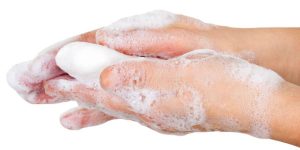
Alarm bells are ringing for you right now. As they should be!
But(t), let’s be practical.
Whether you have a plumber working in your bathroom or not, keep an atomiser spray bottle with a mix of water and disinfectant with an appropriate cleaning cloth in your bathroom. Spray the toilet flush button, the cistern lid, the toilet seat and lid and wipe them over thoroughly.
And if you’re keen to clean the entire bathroom, click here to see another of our easy cleaning tips.
Flushable wipes block drains
As you know, up to 85% of blocked drains are caused by tree roots and can be easily managed.
But, there is a growing number of blocked drains that are caused by “hygienic wipes”. Hygienic wipes block up house drains and sewer mains that cost homeowners and Sydney Water a fortune to maintain. So be careful what you flush!
To put it simply, hygienic wipes don’t break down like toilet paper and as many household pipelines have imperfections, the wipes get caught and cause a blocked drain.
If you are polishing your bottom….. and flushing more wipes, you could be in trouble.
This Choice magazine YouTube video shows how wipes don’t break down for up to 21 hours.
Don’t do this in the bathroom!
During our Coronavirus work schedule, I’ve found some fun hints and tips about plumbing and health that are worth sharing.
How germs spread:
- on your toothbrush,
- your toilet seat,
- and the toilet flush button, are just a few examples.
Get into hot water this Winter!
With the winter season underway, its time to think about hot water.

Take 10 minutes to check on your water heater.
Is it gas or electric?
Check it’s location. Ensure that it’s not leaking on any of the pipes or connections.
Check the cold water control feed tap, usually on the bottom left of the heater. Make sure it turns off and back on.
If you have a storage tank, make sure you check the pressure relief valve is working correctly. And that it’s not leaking.
An efficient water heater will supply all the hot water your family will need this winter.
If you’re not sure, call me on 02 9664 4990!
Know your water heater #1
Hi, its Dave Conroy here from The Lone Drainer and Pronto.
As we approach the winter of 2020, my message for today is about hot water.
You need to know how to turn off the water supply to your water heater.
And most importantly, I want you to know what a temperature and pressure relief valve is.
This 1min 48 sec YouTube clip will show you how it’s done on a 50-litre heater. Yours may be different. If you would like to know more……Call me!
Can Coronavirus be spread through wastewater pipes in a home or hospital?
Sydney April 15th 2020
“Staying connected” has become a part of our language lately.
Did you know we are all connected through the wastewater pipes in our homes?
Whether you live in a single level detached home or a multi-storey building, all our plumbing fittings drain into the same city sewer. That’s your shower, bath, basin, your WC, kitchen sink, washing machine, laundry tubs and floor drains.
A study showed the 2003 SARS virus spread through the plumbing system of a HongKong residential complex whose residents had 300 confirmed cases and 42 deaths- about 1/6th of the infections and fatalities on the entire island.
Our Australian Standards state “all plumbing fixtures must have a working trap or water seal”. That is, the S-bend at the outlet of the fixtures should have water sitting in them OR flowing through them.

Regularly we’re asked to investigate “a sewer smell” in a bathroom or laundry that is nothing more than a dry trap.
But, its allowing smells and bacteria to come from the wastewater and sewer pipes into your room.
Hypothetically, if an infected neighbour flushed their toilet and that wastewater entered a pipe you’re connected to, then bacteria could pass through a dry trap and enter your bathroom.
While person-to-person and surface-to-person is the most common means of spreading Coronavirus, I want you to be aware that any open or dry traps may allow contaminated droplets into your space.
So:
• Do not ignore unexplained foul smells in bathrooms, kitchens or washing areas.
• Ensure all your sink traps and S-bends have water in them.
• Run water into all tubs and showers for a few seconds in the morning and evening, paying particular attention to floor drains in bathrooms and laundries.
• If the wastewater pipework from a toilet, sink or other household appliance appears to be disconnected or open, seal it immediately.
• If you find any crack or leak in pipework, seal it with strong tape.
• Encourage your facilities managers to monitor the wastewater system performance of your building, looking out for things such as drainage overflows or sewer smells.
If you have any questions about this, I invite you to call me.
Tree roots don’t know about Coronavirus
Sydney April 14th 2020
Easter is over for another year.
Although our towns are slowing because of the Coronavirus, and we are quickly changing our daily home and work habits, here at The Lone Drainer and Pronto, we are still working away.
Working from home is putting our normal facilities under a little more pressure. That means the internet, the exercise areas and our bathrooms.
With all that extra baking and comfort meals, our sewers are under a more significant workload. Tree roots don’t know about Coronavirus, and still seek food and water in the sewer pipes they can grow into.
So, if you hear your drains gurgling don’t ignore them. They are asking for help.

Dormant, but active underground
Japanese tech gadget prevents elderly toilet accidents
Sydney April 6th 2020
Approaching a milestone birthday, its fair to say that my personal plumbing is in reasonable working condition. I have a skin check annually and a biennial colonoscopy and prostate check. And, I encourage my peers to do the same.

But, when my middle son recently took a trip to Japan it inspired me to research the technology that’s available with Japanese plumbing.
And apart from the wonderful bidet type toilets that do everything, I found this little gadget.
It simply measures what is going on with your personal plumbing.
When you’re out and about and your bowels need to be emptied, it sends you a text message warning that you’d better get to a toilet in the next ten minutes.
Now, I hope my three boys don’t have to help their dad with his toileting, but the benefits of the Japanese Poo app for the aged and disabled seem like a helpful advancement.
I encourage you to follow the link to see it.
More rain please
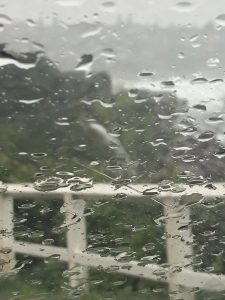
The rain has kept emergency plumbers on their toes.
If you need help with a flooding emergency, please call us.
Meanwhile, blow the rain to the west.
Our country cousins need it!
Storms bring blocked drains
The well-needed rain that arrived in Sydney over the last few days has created many blocked drains and grates that can easily be fixed.
Take the opportunity in between showers to check any pits or drains around your home that may be blocked by leaf debris or dirt. Put on your gardening or washing up gloves to clean them out; it may save you from some unexpected flooding.
The blocked drain shown here was covered by leaves and gum nuts blown off in the storm. It wasn’t able to cope with the deluge of water that caused the garage to flood.
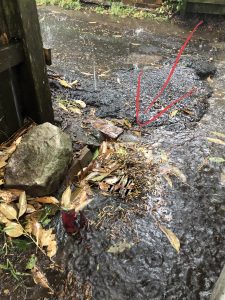
If your roof gutters are full and overflowing, it may be leaf debris and twigs or even a tennis ball from the summer back yard cricket series blocking the gutter outlets.
If you choose to put a ladder up to the roof gutters to have a look, please be very careful.
Take care climbing on your roof.
It may be very slippery!
Gas heater time again
Winter is coming to Sydney.
With some much needed rain approaching as we head towards June 1st, it’s time to go looking for some indoor heating.
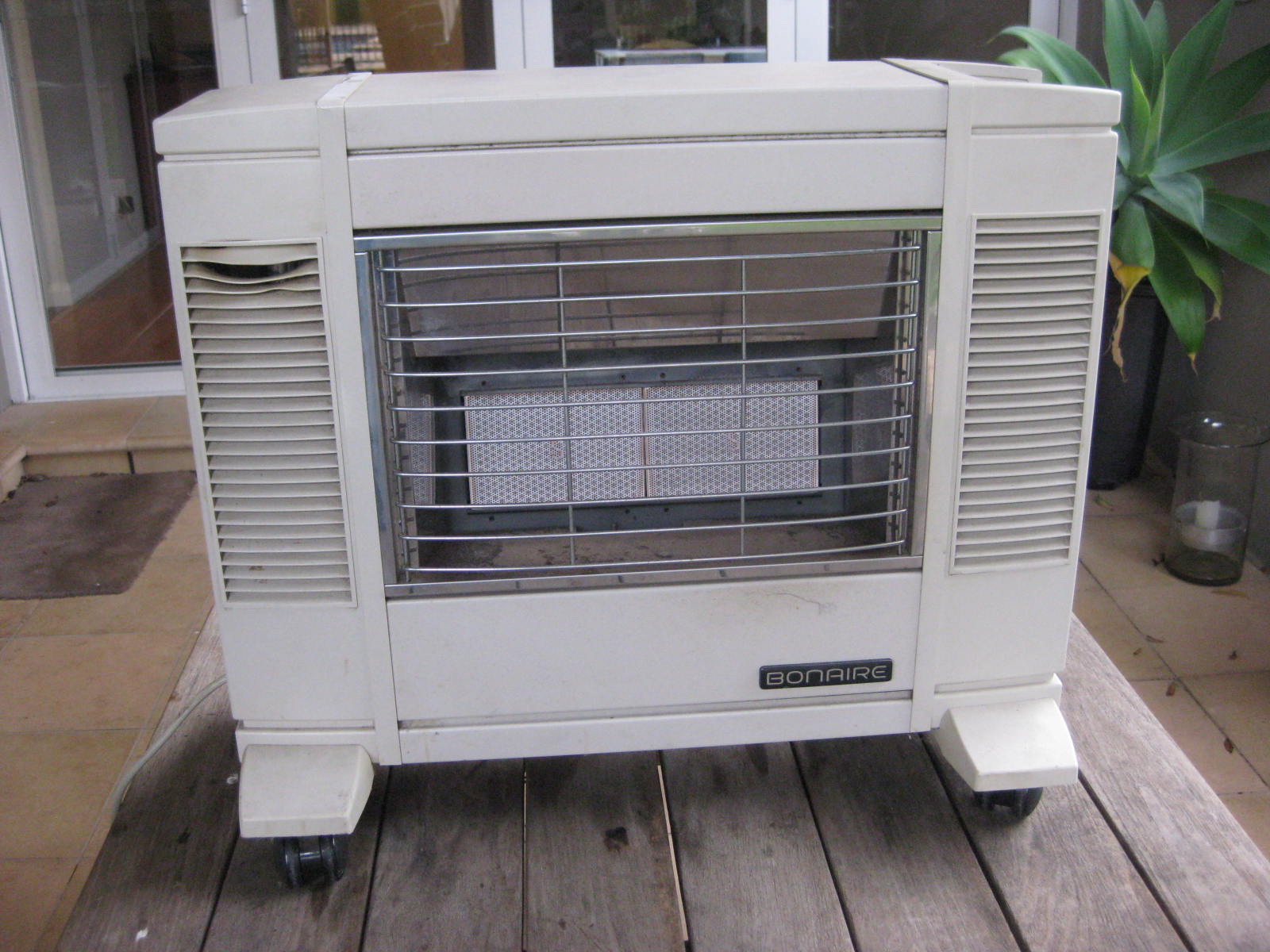
If you haven’t run your gas heater since last winter, please dust it and ensure the bayonet fittings are well lubricated before inserting the heater hose. Don’t forget to check for leaks. Soapy water is one way to do it.
If you’re in Sydney and not sure about your gas appliances – Call Us! 02 9664 4990
My bathroom is flooding!
There are busted pipes in peoples homes every day. Knowing where to turn off your hot and cold water could be the difference between having a few wet items under the kitchen sink and having a total flood.
Yesterday morning we had an urgent phone call with a difference requesting an emergency plumber.
Allan, the homeowner knew exactly where to turn off the water to his home unit. A flexible connection under his bathroom vanity basin had burst.
Allan heard a “pop” then the sound of running water as it gushed out of his bathroom vanity basin onto the floor and out the door. Fortunately, shutting off the water quickly kept the damage to a minimum.
We were able to rescue Allan and his family pronto.
We replaced the ruptured hot flexible connection and changed the corroded looking cold connection also.
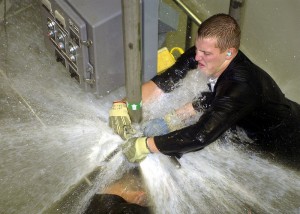
Urgent hot water help
Its really important to know a few simple things about your water heater.
I just had an emergency call from Emma, who returned from visiting the UK for Christmas. While she was away her water heater leaked through the kitchen cupboards, ruined the carpet throughout her home and flooded the property below.
The neighbour below had to force entry into her unit to turn off the water to protect his property.
Over the phone, Emma asked for help replacing her existing water heater.
I asked her to send a picture of the heater and I now know:
- There is no safe tray under the heater. Installing a safe tray to prevent future flooding should be considered.
- The water heater currently is an 80Ltr unit. The modern version is slightly larger and won’t fit in the cupboard. The cupboard may need to be dismantled to remove the existing and fit a new unit.
- A 50-litre heater may also be too big. (Please check the cupboard dimensions)
- The current water heater does not have a tempering valve fitted. Australian Standard states “A tempering valve to be a part of any new hot water installation”.
- There is a flexible connection between the Duo valve and the heater. Australian Standard states “Flexible connections do not comply”.
Does the cold water control valve that shuts off the water to your entire home work efficiently? It will need to, so that the Duo (control) valve the water heater can be worked on.
Take 3 tips.
- Know where your water heater is.
- Know how it turns off.
- Turn off the water and electricity or gas before you go on holidays.
If you’re not sure…ask me.
I don’t like cricket…I love it.
January 6th 2017 sees the rain tumbling down in Sydney’s eastern suburbs.
Day 4 of the New Years 3rd cricket test between Australia and Pakistan is delayed because of the heavy rain.
The gutters and drains around our home and office are full of leaf debris and could cause flooding for anyone who isn’t vigilant
Take a tip
- Check that your storm water drains and down pipes are free of debris before you go to the cricket.
Don’t flush those flushable wipes
As you know, up to 85% of blocked drains are caused by tree roots and can be easily managed.
But, there is a growing number of blockages that are caused by “hygienic wipes”. Hygienic wipes block up house drains and sewer mains that cost homeowners and Sydney Water a fortune to maintain. So be careful what you flush!
Simply, hygienic wipes don’t break down like toilet paper and as many household pipelines have imperfections, the wipes can get caught and cause a blockage.
This Choice magazine Youtube video shows how wipes don’t break down for up to 21 hours.
If you are polishing your bottom….. and flushing more wipes, you could be in trouble.
Don’t flush facial tissues
85% of blocked drains are caused by tree roots. However, what you flush down your loo can also contribute to that blockage.
Ready for Sydney Storm Season
Sydney storm season got under way last night with a spectacular electric light show to compliment Ed Sheeran doing his stuff.

Make sure you take precautions around your home in case severe weather hits.
Severe weather, heavy rain and electrical storms can affect pumps and boosters throughout our network which can affect our water supply and sewer pumping stations.
Here are 5 tips to get you ready:
1. Candle and matches – Have them handy.
2. Know where and how to turn off your water supply.
3. Have 3 days supply of fresh water in containers. Approximately 10 litres per person.
4. Check that your storm water grates and drains are clear of leaf debris and dirt.
5. Ensure your storm water down pipes are clear and not connected to the sewer.
If you’re not sure, Ask us!
Welcome to Movember – Men’s Health Month
Men’s health is something very close to my heart. Having lost my dad in 2009 to prostate cancer at 73 is something that changed the way I look at my own health and health checks.
Over this month Movember I plan to share the personal stories of plumbing colleagues, clients and work mates. They’re all just normal men who felt a slight change in their bodies and had the courage and the good sense or friendly push to go and get things checked out.
I’ve got some simple health tips that work for me and if they work for me, then, they’ll work for you too! I’ve got some great summer recipes.
So, I can hear you asking…. What the hell has men’s health got to do with plumbing? Well it has everything to do with plumbing. Our bodies are temples, our home is our castle and our pipes within our temple and our castles need to function properly or we are “up shit creek”!
I’ve got some YouTube clips to share; some funny, some educational, some frightening!
Just Add Water
Everyone is talking about the upcoming summer like its the imminent return of an old old friend. My sunrise learn-to-surf visits to the local beaches find them full of boys and girls and boot campers getting buffed for the summer unveiling of the new bod. And everyone is drinking water out of water bottles.
Now, hydration is not a new theme and the sweat produced to work that body needs to be topped up with good old H2O, Adams ale, water, the universal solvent. Its well known that people who engage in strenuous physical exertion or live in a hot climate (that’s us people) need to drink plenty of water.
After swallowing more than my share of the Tasman Sea most mornings, I guzzle water from the beach taps to re-hydrate myself.
The human body is anywhere from 55% to 78% water depending on your body size. A simple rule of thumb, 2/3 of our body consists of water.
Did you know that your tissues and organs are mainly made up of water?
• Muscle consists of 75% water, Blood consists of 83% water, Bone consists of 22% of water, Brain consists of 90% of water.
• The recommended amount is 8-10 glasses of aqua per day.
• So remember, if your gonna work it, you have to re-hydrate it.
• Dr Dave says, Drink more water!
Water saving tips for Spring
Now we are really into spring and the gardens are blooming, after our long weekend heatwave, the lawn needs to be watered.
A dripping tap can waste up to anywhere between 30 and 200 litres of water a day. That’s over 70,000 litres a year.
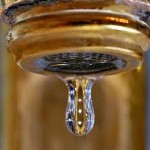
So here are a couple of simple water saving tips to get you through spring and the long hot summer ahead.
Ensure all household and garden taps are always turned off tightly so they don’t drip. Don’t force taps as you can damage them and actually cause leaks.
Develop a regular routine of checking all indoor and outdoor taps, washers and pipes for leaks, cracks and breaks.
Check all your household appliances for water leaks. Learn how to repair leaking taps; a new washer is inexpensive and easily available at your local hardware store.
If in doubt call us for some over the phone guidance on 02 9664 4990.
Help! Where does my Hot Water turn off?
“HELP!“
“My water heater is spitting out hot water and steam. Can you get over here Urgently?” “I don’t know how to turn it off and I think it’s going to explode!”
Monday morning brought a call from Deborah in Randwick. It sounds like a job for The Lone Drainer ……and Pronto.
Of course we were able to rescue Deborah. We replaced the water heater and the gas and water shut-off valves that controlled the unit. But, how many people don’t know how to turn off their water heater?
The image below shows where to shut off the water and gas supply to the heater. Why don’t you practice turning the water heater off when it isn’t urgent?
If you need help Call us 02 9664 4990
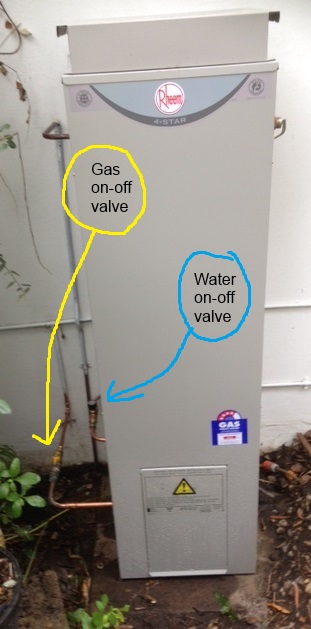
Be careful what you put in your toilet!
Last night we had an emergency call out to a client that we had helped recently. But first, let me paint a picture.
Two weeks ago “Kath”, who lives in a 1920s Coogee building had a blocked shower. Kath said it had been slow to drain since she moved in 6 years ago. A little investigation revealed the original pipes ran through the concrete floor and were corroded internally. Corrosion is one of the drawbacks of living so close to the ocean.
Anyway, The Lone Drainer and Pronto Super-heroes Leigh and Chris, got her shower running “better than ever before”. In fact Kath rang our office to compliment the boys on their Ps, Punctual and Professional.
So I was surprised to get her evening call-out. It turns out her toilet was blocked! But the shower and basin were draining better than ever before. The building has a 2 pipe system; the shower, bath, basin and kitchen sink run down one pipe, while the toilet waste goes down the other.
After a little investigation we found there were tampons caught on the corroded inside of the waste pipe. It was reasonably simple to clear the blockage. Although Kath was a little embarrassed we assured her the best way to prevent it happening again was to follow this simple rule.
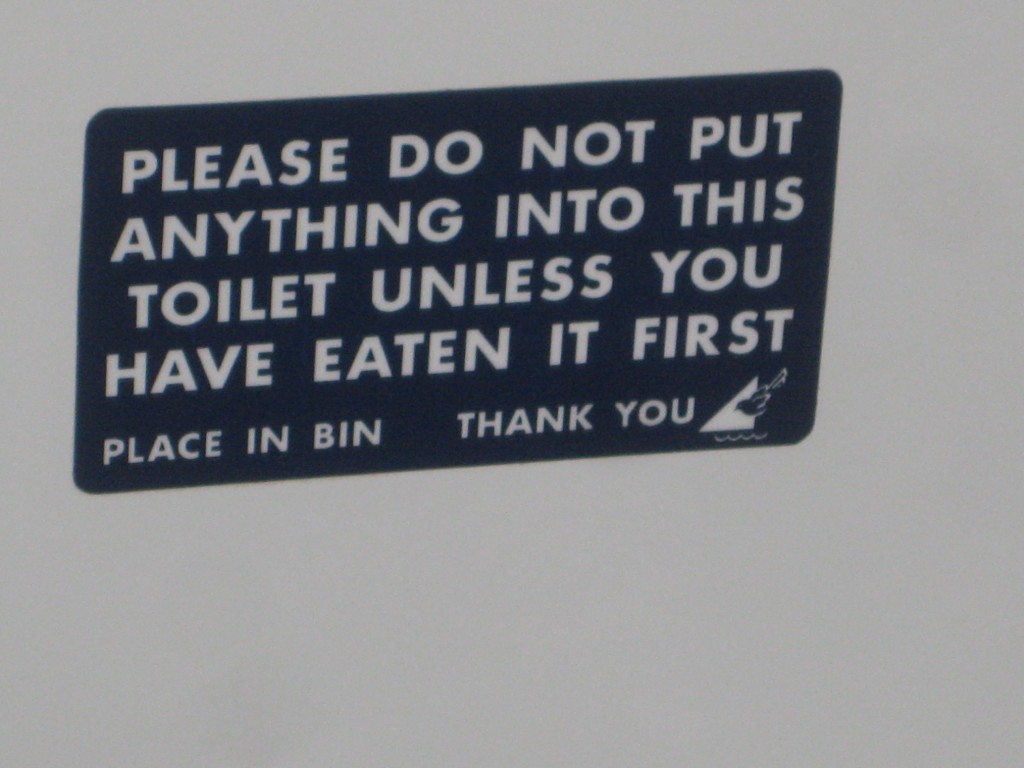
3 Tips for Healthy Hot Water
Who had a cold shower this morning?
Winter makes the need for hot water a high priority. If you think your heater is under performing do this quick water heater health check.
1. Check the colour of your water. If its brown, your water heater has a buildup of sediment or rust.
2. Check your Temperature and Pressure Relief valve (like the one shown below), pull the lever; it should spurt out water till you let go of the lever. If it dribbles afterwards, it needs attention.
3. Does the stop valve work? Try turning it off, test the water at your hot taps and turn it back on. Ideally it should stop the water flow through the heater.
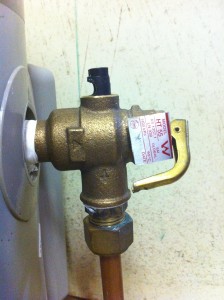
Whether your water heater is gas or electric, storage or continuous, check it regularly.
If your hot water runs out get your friendly plumber to check it over
A plumbing emergency and ducks we’ve rescued
We were called out to this plumbing emergency that brought an unexpected surprise.
Our client had a blocked drain and when we had just about completed that repair, cutting tree roots from her sewer pipes, she called out because she needed a hand in her back yard.
A mother duck that had been nesting in her dense rear garden had chosen today to take her babies for their first swimming lesson. The ducklings took to the water like ….. well, ducks to water. The only problem was that the water level in the pool was a little low, they couldn’t get out of the pool and they were getting very tired.
Our attempts to rescue them by hand and with the pool scoop, brought a tirade of squawking and flapping of wings from the mother duck. She didn’t want us anywhere near her babies! We found a plank in the back shed which we put in the pool and then draped an old towel along the length of the plank, then stood back.
When mother duck settled down she could see we were trying to help, she led the baby ducklings up the plank and after checking they were all out, she herded them back to the nest in the dense undergrowth.
She gave us another flurry of feathers when we tried to check on the babies.
Every day brings another adventure!

Don’t play Noughts and Crosses when you have sewer problems
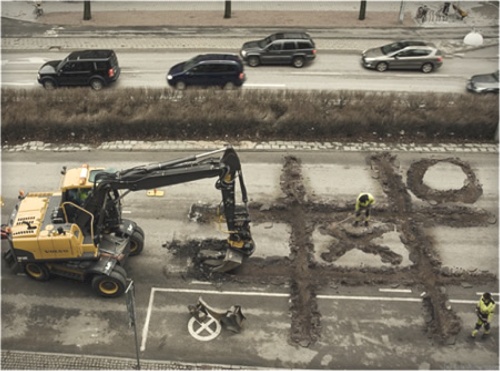
Today’s post comes courtesy of Dr Marc Dussault, The Exponential Growth Strategist. At his recent Exponential Business Building Bootcamp, he showed a series of “impossible pictures” from Swedish Artist Erik Johansson. This photo was of particular interest. This is what we want to avoid with the use of Vaporooter when tree roots get into and block your pipes and drains.
